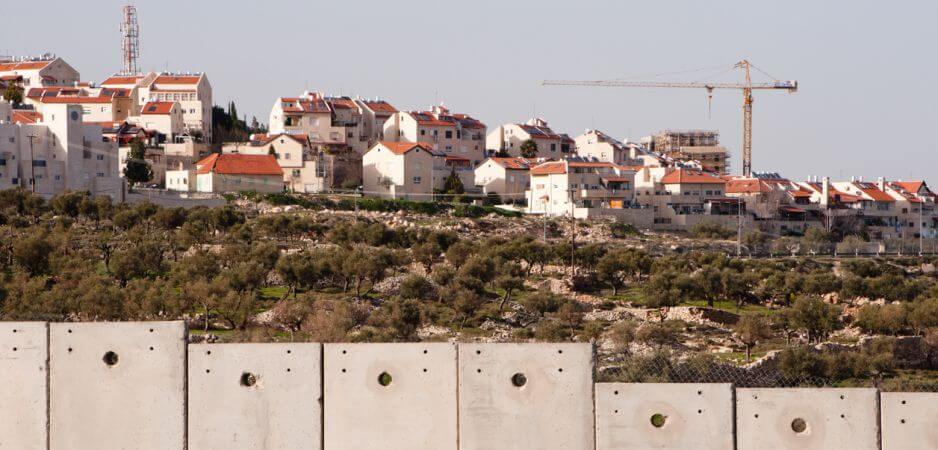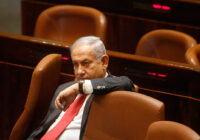Soccer teams from Israeli settlements in the West Bank are likely to be the order of the day at the FIFA Congress in May.
The annual FIFA Congress is likely to become the first international forum since Donald Trump took office to debate Israel’s controversial settlement policy. Israeli efforts to prevent FIFA, the world soccer body, from debating and possibly censoring it for allowing teams from Jewish settlements in the Occupied Palestinian Territories to play in Israeli leagues are complicated by the fact that Trump has called on Benjamin Netanyahu to freeze settlement activity.
The US president has expressed unconditional support for Israel and sharply criticized a resolution in December 2016 in the United Nations Security Council that condemned, with acquiescence of the Obama administration, Israeli settlement policy. Trump, who has made achieving Israeli-Palestinian peace one of his foreign policy goals, nevertheless advised Prime Minister Netanyahu on an official visit to Washington earlier this year that settlements “don’t help the process.”
The settlement issue is likely to take center stage when Palestinian President Mahmoud Abbas meets Trump in Washington in early May, ahead of the FIFA Congress in Bahrain. In a rare official Israeli visit to a Gulf state, representatives of the Israel Football Association (IFA) will be granted visas to Bahrain, a country with which Tel Aviv has no diplomatic relations, to attend the forum.
PRESSURE ON FIFA OVER ISRAEL
Israel has, in recent years, succeeded in thwarting repeated Palestinian efforts to get its membership in FIFA suspended. In a bid to prevent a situation that would put FIFA in a tight spot — at a time that the US Justice Department is prosecuting a number of its senior officials on corruption charges — the world soccer last year appointed South African anti-apartheid icon Tokyo Sexwale to negotiate a solution.
Sexwale proposed three options, all of which are unlikely to provide relief. He initially suggested that FIFA could take the legal risk of throwing in the towel, give Israel six months to rectify the status of the disputed clubs, or continue to attempt to achieve a negotiated solution. Under pressure from Israel, Sexwale dropped any reference to a suspension of Israeli membership. Before he submits the report to FIFA, Israel wants to ensure that any references to punitive action against the Jewish state are removed.
The Palestine Football Association (PFA), human rights groups and a coalition of sports associations, trade unions and faith-based groups are pressuring FIFA to act against Israel. The groups charge that the participation of settlement teams in Israeli competitions violates FIFA rules, the soccer body’s adoption of UN Guiding Principles on Business and Human Rights, and international law that sees Israeli settlements as illegal. FIFA’s bylaws bar any country from setting up teams in another country’s territory, or letting such teams play in its own leagues without the other nation’s consent.
Israeli Foreign Ministry communications with its embassies abroad suggest that Israel fears it may be able to avert the state’s suspension by FIFA, but is unlikely to completely avoid punitive measures against it.
 “Our growing assessment is that the FIFA Congress is liable to make a decision on suspending six Israeli teams that play over the Green Line, or even on suspending Israel from FIFA. We urge you to contact your countries’ representatives on the FIFA Council as soon as possible to obtain their support for Israel’s position, which rejects mixing politics with sport and calls for reaching an agreed solution between the parties … and to thwart an anti-Israel decision if it is brought before the council,” the Foreign Ministry said in a cable. The Green Line constitutes the point that divides the West Bank from Israel and demarks territory occupied by Israel during the 1967 war.
“Our growing assessment is that the FIFA Congress is liable to make a decision on suspending six Israeli teams that play over the Green Line, or even on suspending Israel from FIFA. We urge you to contact your countries’ representatives on the FIFA Council as soon as possible to obtain their support for Israel’s position, which rejects mixing politics with sport and calls for reaching an agreed solution between the parties … and to thwart an anti-Israel decision if it is brought before the council,” the Foreign Ministry said in a cable. The Green Line constitutes the point that divides the West Bank from Israel and demarks territory occupied by Israel during the 1967 war.
SPORTS AND POLITICS
Ironically, the cable spotlights the fundamental problem underlying a lack of integrity in international sports governance: the ungoverned relationship between politics and sports. International sports associations and governments maintain a fiction that sports and politics are separate even if the two are inextricably joined at the hip. The cable serves as evidence of how governments and associations use this story of a separation to corrupt the integrity of sports.
The relationship between sports and politics is equally evident in Palestinian soccer. The PFA is headed by Jibril Rajoub, Palestine’s sports czar, secretary of the central council of Abbas’ ruling Fatah party, and a former security chief who spent 17 years in Israeli prison. Rajoub recently weakened the PFA’s battle with the IFA by repeatedly refusing in a debate in New York with an Israeli peace negotiator to condemn Palestinian attacks on Israeli Jews. Rajoub has praised in recent years a wave of knife attacks on Israeli soldiers and civilians.
FIFA may well attempt to buy time by adopting Sexwale’s option to give Israel six months to rectify the situation. A FIFA Congress decision to that effect would, however, effectively constitute a defeat for Israel because it implicitly acknowledges that allowing settlement teams to play in Israeli leagues constitutes a violation of FIFA rules and international law.
While Israel is certain to reject the notion, a six-month grace period would also buy Tel Aviv time to further counter the growing boycott, diversification and sanctions (BDS) movement that seeks to penalize Israel for continued occupation of the West Bank. Israel has made countering BDS one of its foreign policy priorities. The Netanyahu government recently emulated Trump’s disputed ban on travel to the US from six Muslim-majority countries by banning BDS supporters from traveling to Israel.
FIFA’s groping with the Israeli-Palestinian conflict is likely to serve as a bell weather of international attitudes toward Jewish settlements at a time that many members of the international community are exasperated with the policies of the Netanyahu government, the most right wing in Israeli history. It is also likely to put the Trump administration’s support for Israel to the test.
The views expressed in this article are the author’s own and do not necessarily reflect Fair Observer’s editorial policy.
Photo Credit: rrodrickbeiler
Support Fair Observer
We rely on your support for our independence, diversity and quality.
For more than 10 years, Fair Observer has been free, fair and independent. No billionaire owns us, no advertisers control us. We are a reader-supported nonprofit. Unlike many other publications, we keep our content free for readers regardless of where they live or whether they can afford to pay. We have no paywalls and no ads.
In the post-truth era of fake news, echo chambers and filter bubbles, we publish a plurality of perspectives from around the world. Anyone can publish with us, but everyone goes through a rigorous editorial process. So, you get fact-checked, well-reasoned content instead of noise.
We publish 2,500+ voices from 90+ countries. We also conduct education and training programs
on subjects ranging from digital media and journalism to writing and critical thinking. This
doesn’t come cheap. Servers, editors, trainers and web developers cost
money.
Please consider supporting us on a regular basis as a recurring donor or a
sustaining member.
Will you support FO’s journalism?
We rely on your support for our independence, diversity and quality.






